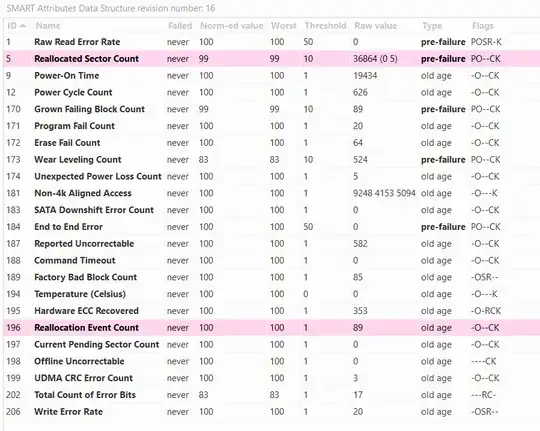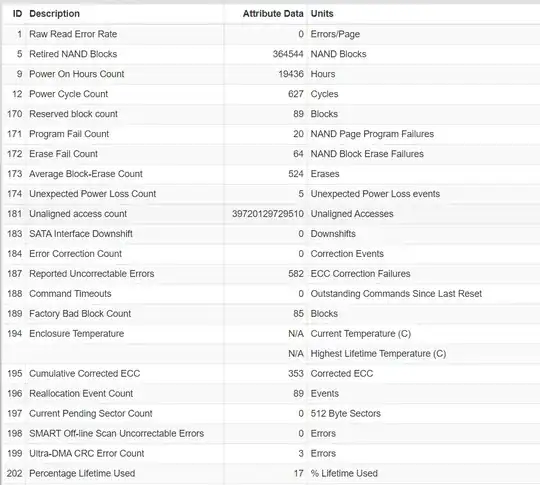I have an external SSD that suffered some file corruption earlier this week. Model is
Model Family: Crucial/Micron RealSSD m4/C400/P400
Device Model: M4-CT256M4SSD2
with, apparently, 20,000 power on hours on the clock.
Even though the status is:
SMART overall-health self-assessment test result: PASSED
the self-testing is failing:
gsmartcontrol reports the attributes as:
Full output is:
smartctl 7.2 2020-12-30 r5155 [x86_64-w64-mingw32-w10-b19045] (sf-7.2-1)
Copyright (C) 2002-20, Bruce Allen, Christian Franke, www.smartmontools.org
=== START OF INFORMATION SECTION ===
Model Family: Crucial/Micron RealSSD m4/C400/P400
Device Model: M4-CT256M4SSD2
Serial Number: 0000000012050904896A
LU WWN Device Id: 5 00a075 10904896a
Firmware Version: 0309
User Capacity: 256,060,514,304 bytes [256 GB]
Sector Size: 512 bytes logical/physical
Rotation Rate: Solid State Device
Form Factor: 2.5 inches
TRIM Command: Available, deterministic
Device is: In smartctl database [for details use: -P show]
ATA Version is: ACS-2, ATA8-ACS T13/1699-D revision 6
SATA Version is: SATA 3.0, 6.0 Gb/s (current: 6.0 Gb/s)
Local Time is: Wed Apr 05 11:36:29 2023 PM
SMART support is: Available - device has SMART capability.
SMART support is: Enabled
AAM feature is: Unavailable
APM level is: 254 (maximum performance)
Rd look-ahead is: Enabled
Write cache is: Enabled
DSN feature is: Unavailable
ATA Security is: Disabled, NOT FROZEN [SEC1]
=== START OF READ SMART DATA SECTION ===
SMART Status not supported: Incomplete response, ATA output registers missing
SMART overall-health self-assessment test result: PASSED
Warning: This result is based on an Attribute check.
General SMART Values:
Offline data collection status: (0x80) Offline data collection activity
was never started.
Auto Offline Data Collection: Enabled.
Self-test execution status: ( 117) The previous self-test completed having
the read element of the test failed.
Total time to complete Offline
data collection: ( 1190) seconds.
Offline data collection
capabilities: (0x7b) SMART execute Offline immediate.
Auto Offline data collection on/off support.
Suspend Offline collection upon new
command.
Offline surface scan supported.
Self-test supported.
Conveyance Self-test supported.
Selective Self-test supported.
SMART capabilities: (0x0003) Saves SMART data before entering
power-saving mode.
Supports SMART auto save timer.
Error logging capability: (0x01) Error logging supported.
General Purpose Logging supported.
Short self-test routine
recommended polling time: ( 2) minutes.
Extended self-test routine
recommended polling time: ( 19) minutes.
Conveyance self-test routine
recommended polling time: ( 3) minutes.
SCT capabilities: (0x003d) SCT Status supported.
SCT Error Recovery Control supported.
SCT Feature Control supported.
SCT Data Table supported.
SMART Attributes Data Structure revision number: 16
Vendor Specific SMART Attributes with Thresholds:
ID# ATTRIBUTE_NAME FLAGS VALUE WORST THRESH FAIL RAW_VALUE
1 Raw_Read_Error_Rate POSR-K 100 100 050 - 0
5 Reallocated_Sector_Ct PO--CK 099 099 010 - 36864 (0 5)
9 Power_On_Hours -O--CK 100 100 001 - 19434
12 Power_Cycle_Count -O--CK 100 100 001 - 626
170 Grown_Failing_Block_Ct PO--CK 099 099 010 - 89
171 Program_Fail_Count -O--CK 100 100 001 - 20
172 Erase_Fail_Count -O--CK 100 100 001 - 64
173 Wear_Leveling_Count PO--CK 083 083 010 - 524
174 Unexpect_Power_Loss_Ct -O--CK 100 100 001 - 5
181 Non4k_Aligned_Access -O---K 100 100 001 - 9248 4153 5094
183 SATA_Iface_Downshift -O--CK 100 100 001 - 0
184 End-to-End_Error PO--CK 100 100 050 - 0
187 Reported_Uncorrect -O--CK 100 100 001 - 582
188 Command_Timeout -O--CK 100 100 001 - 0
189 Factory_Bad_Block_Ct -OSR-- 100 100 001 - 85
194 Temperature_Celsius -O---K 100 100 000 - 0
195 Hardware_ECC_Recovered -O-RCK 100 100 001 - 353
196 Reallocated_Event_Count -O--CK 100 100 001 - 89
197 Current_Pending_Sector -O--CK 100 100 001 - 0
198 Offline_Uncorrectable ----CK 100 100 001 - 0
199 UDMA_CRC_Error_Count -O--CK 100 100 001 - 3
202 Perc_Rated_Life_Used ---RC- 083 083 001 - 17
206 Write_Error_Rate -OSR-- 100 100 001 - 20
||||||_ K auto-keep
|||||__ C event count
||||___ R error rate
|||____ S speed/performance
||_____ O updated online
|______ P prefailure warning
General Purpose Log Directory Version 1
SMART Log Directory Version 1 [multi-sector log support]
Address Access R/W Size Description
0x00 GPL,SL R/O 1 Log Directory
0x01 SL R/O 1 Summary SMART error log
0x02 SL R/O 51 Comprehensive SMART error log
0x03 GPL R/O 16383 Ext. Comprehensive SMART error log
0x04 GPL,SL R/O 255 Device Statistics log
0x06 SL R/O 1 SMART self-test log
0x07 GPL R/O 3449 Extended self-test log
0x09 SL R/W 1 Selective self-test log
0x10 GPL R/O 1 NCQ Command Error log
0x11 GPL R/O 1 SATA Phy Event Counters log
0x80-0x9f GPL,SL R/W 16 Host vendor specific log
0xa0 GPL VS 2000 Device vendor specific log
0xa0 SL VS 208 Device vendor specific log
0xa1-0xbf GPL,SL VS 1 Device vendor specific log
0xc0 GPL VS 80 Device vendor specific log
0xc1-0xdf GPL,SL VS 1 Device vendor specific log
0xe0 GPL,SL R/W 1 SCT Command/Status
0xe1 GPL,SL R/W 1 SCT Data Transfer
SMART Extended Comprehensive Error Log Version: 1 (16383 sectors)
No Errors Logged
SMART Extended Self-test Log size 3449 not supported
SMART Self-test log structure revision number 1
Num Test_Description Status Remaining LifeTime(hours) LBA_of_first_error
1 Extended offline Completed: read failure 50% 19433 244627776
2 Short offline Completed: read failure 60% 19433 492159152
3 Short offline Completed: read failure 60% 16715 492159152
4 Vendor (0xff) Completed without error 00% 16602 -
5 Vendor (0xff) Completed without error 00% 5107 -
SMART Selective self-test log data structure revision number 1
SPAN MIN_LBA MAX_LBA CURRENT_TEST_STATUS
1 0 0 Not_testing
2 0 0 Not_testing
3 0 0 Not_testing
4 0 0 Not_testing
5 0 0 Not_testing
Selective self-test flags (0x0):
After scanning selected spans, do NOT read-scan remainder of disk.
If Selective self-test is pending on power-up, resume after 0 minute delay.
SCT Status Version: 3
SCT Version (vendor specific): 1 (0x0001)
Device State: Active (0)
Current Temperature: 0 Celsius
Power Cycle Min/Max Temperature: --/ 0 Celsius
Lifetime Min/Max Temperature: --/ 0 Celsius
SCT Temperature History Version: 2
Temperature Sampling Period: 10 minutes
Temperature Logging Interval: 10 minutes
Min/Max recommended Temperature: 0/70 Celsius
Min/Max Temperature Limit: -5/75 Celsius
Temperature History Size (Index): 478 (151)
Index Estimated Time Temperature Celsius
152 2023-04-02 04:00 ? -
... ..(473 skipped). .. -
148 2023-04-05 11:00 ? -
149 2023-04-05 11:10 0 -
150 2023-04-05 11:20 0 -
151 2023-04-05 11:30 0 -
SMART WRITE LOG does not return COUNT and LBA_LOW register
SCT (Get) Error Recovery Control command failed
Device Statistics (GP Log 0x04)
Page Offset Size Value Flags Description
0x01 ===== = = === == General Statistics (rev 2) ==
0x01 0x008 4 626 --- Lifetime Power-On Resets
0x01 0x010 4 19434 --- Power-on Hours
0x01 0x018 6 66167492621 --- Logical Sectors Written
0x01 0x020 6 1499672681 --- Number of Write Commands
0x01 0x028 6 138123876618 --- Logical Sectors Read
0x01 0x030 6 2013843720 --- Number of Read Commands
0x04 ===== = = === == General Errors Statistics (rev 1) ==
0x04 0x008 4 582 --- Number of Reported Uncorrectable Errors
0x04 0x010 4 0 --- Resets Between Cmd Acceptance and Completion
0x05 ===== = = === == Temperature Statistics (rev 1) ==
0x05 0x008 1 0 --- Current Temperature
0x05 0x010 1 0 --- Average Short Term Temperature
0x05 0x018 1 0 --- Average Long Term Temperature
0x05 0x020 1 0 --- Highest Temperature
0x05 0x028 1 0 --- Lowest Temperature
0x05 0x030 1 0 --- Highest Average Short Term Temperature
0x05 0x038 1 0 --- Lowest Average Short Term Temperature
0x05 0x040 1 0 --- Highest Average Long Term Temperature
0x05 0x048 1 0 --- Lowest Average Long Term Temperature
0x05 0x050 4 - --- Time in Over-Temperature
0x05 0x058 1 70 --- Specified Maximum Operating Temperature
0x05 0x060 4 - --- Time in Under-Temperature
0x05 0x068 1 0 --- Specified Minimum Operating Temperature
0x06 ===== = = === == Transport Statistics (rev 1) ==
0x06 0x008 4 13903 --- Number of Hardware Resets
0x06 0x010 4 0 --- Number of ASR Events
0x06 0x018 4 3 --- Number of Interface CRC Errors
0x07 ===== = = === == Solid State Device Statistics (rev 1) ==
0x07 0x008 1 4 N-- Percentage Used Endurance Indicator
|||_ C monitored condition met
||__ D supports DSN
|___ N normalized value
SATA Phy Event Counters (GP Log 0x11)
ID Size Value Description
0x0001 4 0 Command failed due to ICRC error
0x000a 4 0 Device-to-host register FISes sent due to a COMRESET
Crucial's own SMART report:
I'm not too sure how to interpret the gsmartctl output, but I'm not convinced that the SMART PASSED result is correct. Time to bin and replace this drive?



